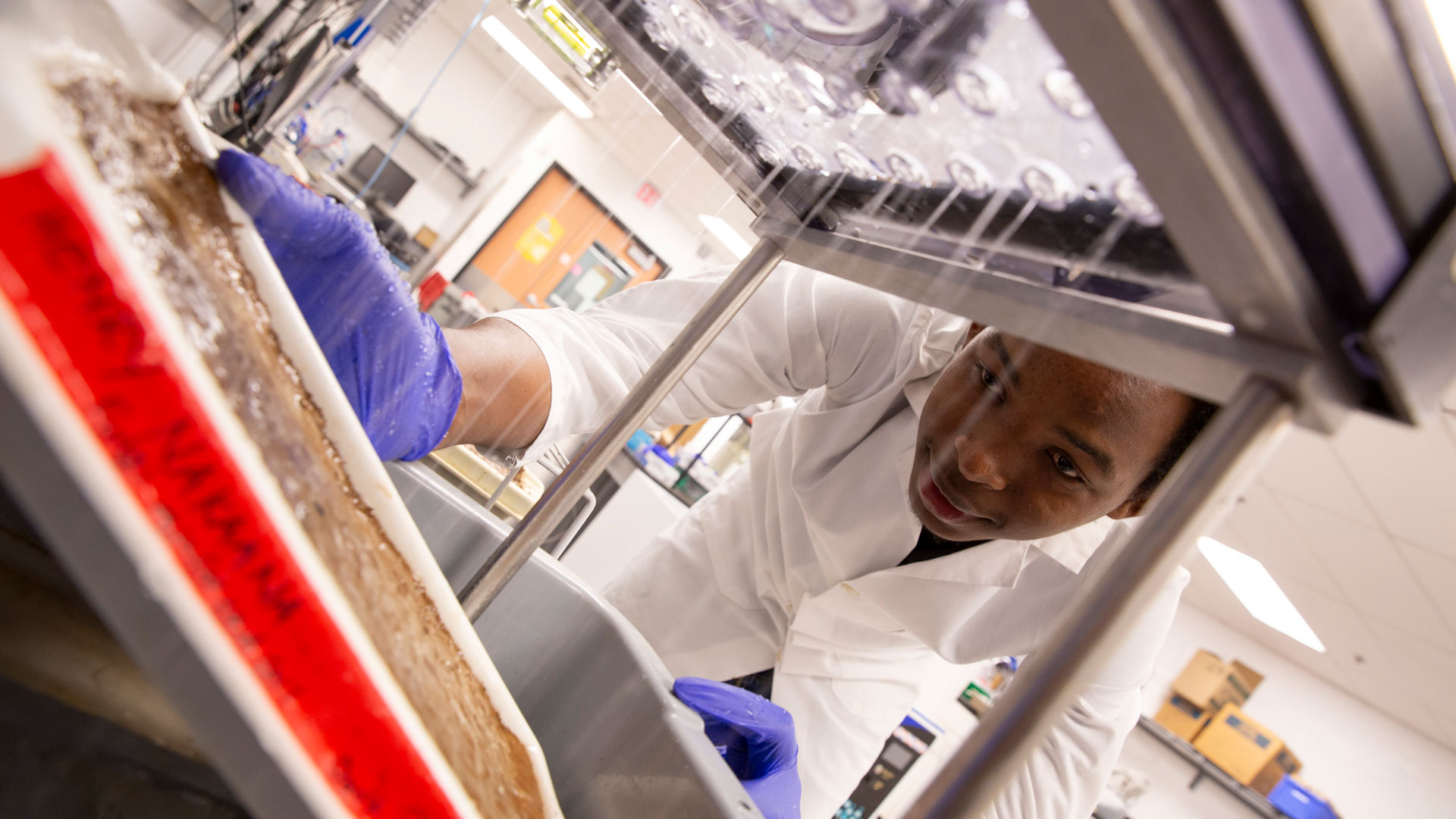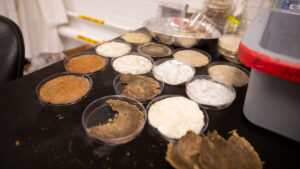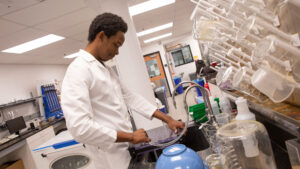Henry Nakaana
Civil engineering
Hometown: Masaka, Central Uganda, Uganda
Graduation date: Spring 2024
FURI | Spring 2024
Bio Stimulation of Fungi-Mycelium Create a Natural Geotextile Capable of Mitigating Post-Wildfire Soil Erosion
Climate change has increased the prevalence and severity of wildfires and heavy rains, severely impacting ecosystems and soil. These events strip away vegetation, leaving soil exposed and prone to erosion. To address this, this research project explores the engineered growth of fungi in burnt soils as a novel, cost-effective erosion control method. Fungi mycelium, with its web-like structure, can bind soil, creating a protective mat that prevents erosion and potentially reduces landslide risks. The focus of this work is on bio-stimulating fungi growth in fire-affected soils to form a natural layer that enhances soil stability and erosion resistance.
Mentor: Emmanuel Salifu
Featured project | Spring 2024

Civil engineering major Henry Nakaana was drawn to ASU because its focus on research and sustainability aligned with his interest in solving real-world problems with innovative, sustainable solutions that make a positive impact on the world. His FURI project with Emmanuel Salifu, an assistant professor of civil and environmental engineering, involves engineering fungi that could help support areas affected by increasingly frequent wildfires and heavy rains that make soil vulnerable to erosion and landslides. Nakaana is a first-year student in his second semester — the earliest a Fulton Schools student can participate in FURI.
What made you want to get involved in FURI and the project you’re working on?
I joined FURI to gain experience in research, obtain knowledge that can help me improve my career and technical engineering skills, and also contribute valuable insights to the scientific community. My project explores the engineered growth of fungi as a novel method to improve stability and erosion resistance on post-wildfire soils. I chose this project because it aligns with my passion for using nature-based solutions to solve engineering problems.
How will your engineering research project impact the world?
Today the occurrence of wildfires is expected to increase greatly in the northern parts of the U.S. and Canada, which will leave soil exposed to erosion and landslides. My research project offers an effective, budget-friendly and fast way to protect post-wildfire soils compared to other available solutions. My project also shows the additional advantages of using fungi on soil such as carbon sequestration, which helps reduce global climate change.
What has been your most memorable experience as a student researcher?
One of my most memorable moments was when I realized the initial fungi growth on the soil. It was so amazing how fungi can grow in as little as two days to cover the whole soil surface. It made me feel more like an explorer uncovering secrets in a scientific space whose potential has not been discovered.
Have there been any surprises in your research?
I’ve had a couple of surprises. The fungi grew much faster than I thought, and it turns out fungi don’t really like water. The speedy growth was unexpected, and finding out fungi is hydrophobic added an interesting twist. It has made me even more curious and excited about using fungi to mitigate soil erosion on post-wildfires soils. These surprises are pushing me to explore and improve my method for making soil stronger with fungi.
How do you see this experience helping with your career or advanced degree goals?
The unique combination of engineering and ecological considerations in this project aligns perfectly with my career aspirations to use use of sustainable technology. Furthermore, this experience not only adds depth to my academic qualifications but also establishes a valuable network within the scientific community on a research topic that is just growing globally.
Collaborating with experts in the field through my mentor has broadened my perspective and allowed me to contribute to cutting-edge research. These aspects, combined with the tangible outcomes of the project, will increase my credibility and open doors to opportunities for further education and advancement in my engineering career.
What is the best advice you’ve gotten from your faculty mentor?
The best advice my mentor gave me is to work toward publishing my work. This means sharing what I’ve learned with other scientists and spreading the word about my work. This way, I’m not just helping myself, but also contributing to what scientists know. It’s a way of joining a bigger conversation in science. It makes me feel like I’m part of something important and can help others in the same field. This advice will help contribute to future studies and potentially be able to make a difference in the world.
Why should other students get involved in FURI?
I strongly recommend this program because it offers a chance to gain valuable skills like problem-solving, research and teamwork that prepare you for the dynamic nature of real-world projects.

